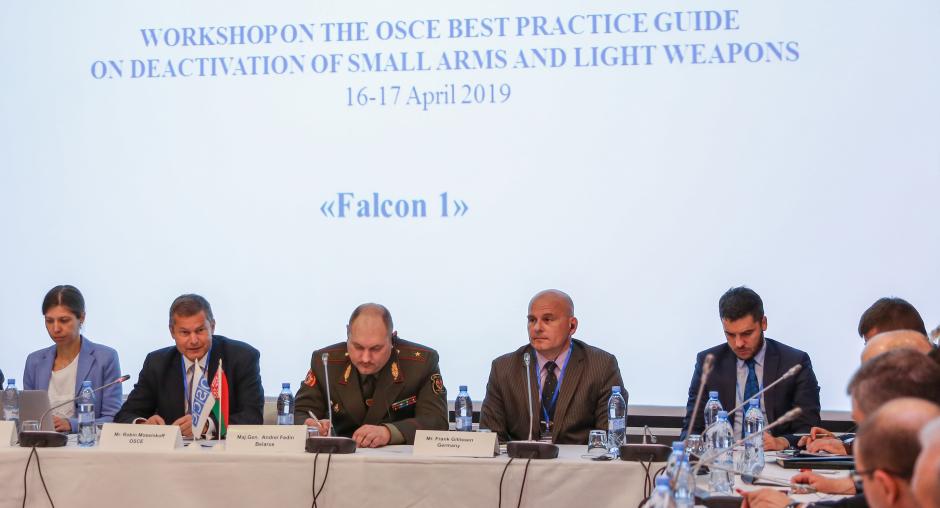Best practices in the deactivation of small arms and light weapons focus of OSCE workshop in Minsk

The OSCE Best Practice Guide on Deactivation of Small Arms and Light Weapons (SALW) was the focus of a two-day regional workshop organized by the OSCE Conflict Prevention Centre and the Ministry of Defence of Belarus on 16 and 17 April 2019.
The regional workshop brought together participants from Armenia, Azerbaijan, Belarus, France, Germany Latvia, Moldova, the Russian Federation, Spain, United Kingdom, INTERPOL and EUROPOL. It aimed at supporting OSCE participating States in applying the SALW deactivation standards, approaches and procedures in their efforts to combat the diversion and the illicit transfers of such weapons. It also provided guidance on how to streamline and implement legislation strengthening SALW controls to prevent illicit firearms trafficking.
Opening the workshop, the Chief of Staff of Armament, the Belarus Armed Forces Major General Andrei Fedin said that one of the prerequisites to the safety of and stability in societies is the control of SALW. Belarus has developed a comprehensive set of norms and regulations as well as good expertise in this field, he said. “Deactivation is one of the means of control of the firearms,” said Major General Fedin.
Representative of the Permanent Mission of Germany to the OSCE, Frank Gillissen, said: “Germany has always considered SALW as a potential threat to peace and security, and your presence underlines that your governments shares this point of view. In order to reduce these threats it is absolutely necessary to foster international co-operation in countering terrorism and to join efforts and to share relevant information in regard to illicit trafficking of weapons, ammunition and explosives.”
The Head of the Support Section to the Forum for Security Co-operation at the OSCE Conflict Prevention Centre, Robin Mossinkoff, noted that the OSCE’s co-operation with Belarus in the field of small arms and light weapons and stockpiles of conventional ammunition is exemplary and highly valued. He also thanked Germany for its support to important initiatives that contribute considerably to stability and security in societies.
“The OSCE is a frontrunner in setting the minimum standards for SALW deactivation and in addressing the issue of deactivation in practice,” he said. “The OSCE participating States are incorporating these standards into their national norms and legislation. The stronger the laws on deactivation are, and the clearer the deactivation procedures and the subsequent enforcement of these in practice are, the more useful this will be for all stakeholders dealing with weapons of any sort.”
The workshop also included a visit to a weapons deactivation facility of the Belarus Armed Forces.
